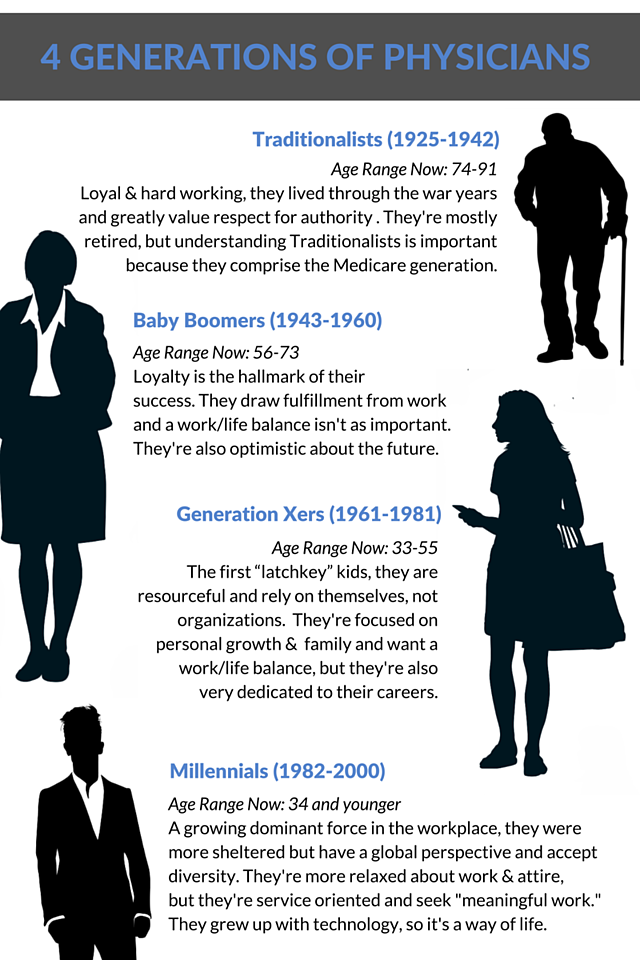
You are a product of your generation and the generational divide affects us all in countless ways. It isn’t new, but generational differences affect physician recruitment and retention in ways that may surprise you, too. Consider this shocking fact from a recent report about generational differences: 33% of Millennials think it is acceptable to text during a job interview! What’s more, 25% of Millennials think that working somewhere for nine months shows that you are a loyal employee, contrasted with 14% of Baby Boomers who said you have to be at a company for more than five years to be a loyal employee.
Generational differences are a growing (and costly) challenge for recruiters and organizations.
Differences among generations aren’t simply the typical transition of a new or younger physician – one who is simply acclimating to a workplace culture. The ongoing arrival of Millenials to the workforce means as many as four generations are now working side by side on medical staffs. This creates an all-new generational dynamic that is most apparent in recruiting, training, technology use, communication, work style, and motivation and retention.
Defining four generations.
A generation is a group of individuals born during a certain era (within a 20-year time period). These individuals share values and attitudes that are based on experiences during their formative years. Their “generational personality” often reflects the era’s important events and cultural trends, its way of life, and even its celebrities of the day. Physician candidates who share a generation or generational personality often have similar view on issues from religion, to family, to politics – and those values affect their outlook on work and their work ethic.
Keep in mind, the characteristics that describe different generations aren’t necessarily good or bad, they’re simply helpful to understand to ensure you’re better prepared to address physician candidate needs and interests. You’ll also be more alert to possible “negative” issues or triggers. Understanding generational characteristics means rethinking your recruitment strategies – figuring out what today’s physician candidates really want – and offering incentives that appeal to specific candidates.
Let’s start with the Traditionalists, often also called the “Silent Generation.” Born between 1925 and 1942, this group makes up a shrinking portion of working physicians, but healthcare in particular has a unique stake in really understanding this generation because they also comprise the Medicare population. Traditionalists lived during war years and their experiences, typically in the military, taught them respect for authority – so they also expect young people to show respect for their elders. Traditionalists prefer stability and rules and they aren’t comfortable with change. They also believe good work will be rewarded, so they’re loyal and hardworking.
Baby Boomers, the “Children of the Sixties", believe in working long hours and loyalty is the hallmark of their success. They’ve begun to reach retirement age, but our economic downturn will likely slow their departure from work. The era of global rebuilding and recovering economies means Baby Boomers are optimistic about the future. And because they draw a sense of fulfillment from work, work/life balance isn’t as important to Baby Boomers so they’re willing to sacrifice family and personal time.
Generation X or Xers grew up in a world of divorce, economic instability, and high crime. Because their Baby Boomer parents were typically working, Xers are the first “latchkey” children, which means they rely on themselves not organizations. Xers are independent and resourceful, and they tend to focus more on themselves and their family than Baby Boomers. They seek a work/life balance, but they're also very dedicated to their careers.
Millenials or Generation Y will become the most dominant working generation in the next decade. The product of the “Baby on Board” syndrome, Millenials were sheltered as children. This generation went through the standardization of education and, therefore, continue to seek positive feedback in their work - silence is often interpreted negatively. Millenials also seek quick results and technology isn’t a tool but a way of life. They prefer informal communication, attire, and even approach work informally. Millennials are a socially conscious and service-oriented generation, and because they were raised with a global perspective, they've developed an acceptance and respect for diversity. Millenials also more likely to turn to their family for guidance and support and they’re very focused on doing “meaningful work” – something physician recruiters should really take note of.
Here's a visual recap you can use as a reminder:

Employing “emotional intelligence” to generational recruiting.
Each generation brings its own set of values, beliefs, life experiences, and attitudes that should be addressed in physician recruitment and retention strategies. Using a term made popular by Daniel Goleman in 1995, you might consider employing “emotional intelligence (EI)” – a process of understanding your own generational personality and biases, and learning about candidates’ differences that are based on generational issues. Companies worldwide routinely look through the lens of EI to recruit, hire, promote, and develop employees and physician recruiters are no exception.
Keep in mind, there’s no “one size fits all” approach to generational recruitment – and you should absolutely avoid stereotyping. Every physician is an individual with his or her own unique career motivations, yet each generation of physician candidates has different priorities, attitudes, and communication styles that speaks to their generation. Every physician candidate can also exhibit a mix of generational characteristics. But if you understand why candidates from different generations have different values, you can appreciate every candidate’s age, background, personality, and biases. That enables you to offer incentives that appeal to them and recruit the right physician candidate for the right opportunity.
Generation differences affect culture, and that affects how and where physician recruiters reach out to candidates. To attract a broad tool of candidates to your organization, it’s important to create diverse messages that address the attitudes and interests of different generations – and communicate in the places where candidates discover them.